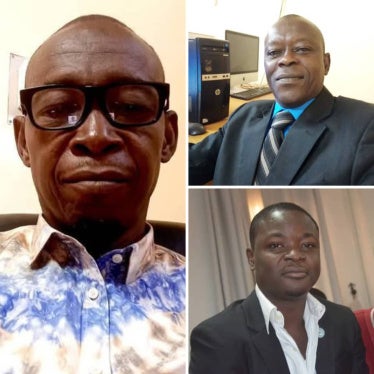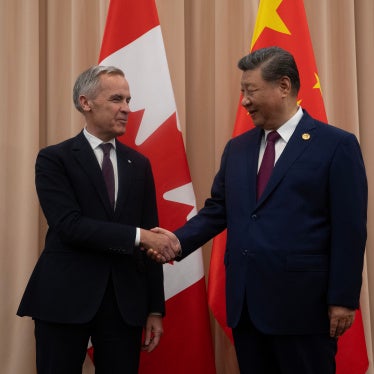(Johannesburg) – The Angolan government should end its use of unnecessary force, including by plainclothes agents, against peaceful anti-government protests, Human Rights Watch said today.
On December 3, 2011, police and plainclothes security agents violently dispersed a peaceful rally of about 100 youth in Luanda, the capital, and injured at least 14, one of whom had a serious face wound, Human Rights Watch said. The demonstrators were protesting the 32-year rule of President José Eduardo dos Santos, whom they blame for rampant corruption, widespread poverty, and political repression. The security agents used an irritant spray against journalists and a Human Rights Watch researcher, who were covering the demonstration. The police briefly detained four Angolan journalists, but denied the arrests in a statement quoted by the state-owned news agency Angop on December 4.
“If the Angolan government was hoping to hide its violent attacks on peaceful demonstrators, it has failed,” said Daniel Bekele, Africa director at Human Rights Watch. “Government agents used unnecessary force against peaceful protesters, and then tried to keep journalists from reporting it.”
The December 3 rally by the youth movement, which is loosely grouped via social media, was one of several anti-government protests over the past few months. Marches were planned to start at two points in Luanda’s poor and populous periphery – Cazenga and São Paulo – and to converge at Independence Square in the city center. From there they were to head to the presidential palace. In keeping with legal requirements, the organizers informed Angolan authorities, but the organizers did not receive an official response.
In Cazenga, a Human Rights Watch researcher observed several police officers with military assault rifles – in addition to the police with batons and plainclothes agents – enter the area of the demonstration after journalists left the area. At that point, demonstrators told Human Right Watch, the security forces violently attacked them with the batons and irritant liquids. The researcher saw a police car moving at high speed down a street that was partly occupied by demonstrators. Witnesses reported that the car, which they alleged was the local police commander’s, struck and injured a demonstrator.
In the city center, the authorities blocked access to Independence Square and deployed a large force of uniformed and plainclothes police, dog and horse squads, and helicopters.Security agents in civilian clothes, most of them wearing hats and sunglasses to conceal their faces, were highly visible at the rallies and participated in the police crackdown.Human Rights Watch observed police officers near Independence Square striking demonstrators with batons and chasing them to the main boulevard, where there was heavy traffic. Police did not seal off any streets to prevent accidents during the demonstration.
In Cazenga and the city center, Human Rights Watch observed plainclothes security agents carrying mineral water bottles that contained an unknown liquid. The agents were observed spraying the liquid at demonstrators, journalists and others, irritating their faces and eyes, causing temporary blindness and in some cases fainting.
In the afternoon at the boulevard near Independence Square, the same agents were seen spraying the bottled substance directly into the faces and eyes of protest leaders, and then beating them with batons. Security agents also targeted a journalist from Novo Jornal and unsuccessfully attempted to seize his camera. The agents also sprayed a Human Rights Watch researcher who was observing the crackdown and interviewing demonstrators, police officers and journalists. These attacks took place in front of uniformed police, who did nothing to intervene.
The Human Rights Watch researcher described the incident:
I was walking down the sidewalk toward Independence Square, waiting for a calm moment to cross the boulevard and join a group of journalists. I was interviewing one of the demonstrators, the rap musician Dionísio “Carbono” Casimiro. There were at least seven police officers and a dozen passers-by. We were about 20 meters away from the traffic island where the police were striking protesters with their batons. Suddenly, several men wearing plain clothes sprayed a liquid into our faces and eyes. The liquids created a burning sensation that blinded me for an instant, and I lost my glasses. The attackers didn’t beat me, although they later beat Carbono, who had fled in another direction. After I had washed the substance away with water, I went back and asked the police officers if they had seen anything. They denied any knowledge of the incident.
Human Rights Watch later identified the attackers on a video taken by a demonstrator. They were four men wearing hats and sunglasses, and carrying mineral water bottles.
At 4:30 p.m. near the Independence Square, police arrested four journalists – Isabel João and António Paulo from the private weekly newspaper Novo Jornal, Coque Mukuta from Rádio Despertar, and the prominent investigative journalist Rafael Marques – and drove them to the police post, where they were briefly detained.
The arrests occurred after several plainclothes security agents approached the journalists and the Human Rights Watch researcher, and aggressively ordered them to leave. The journalists asked them whether they were police agents who had the authority to order the journalists to leave a public place. One of the men replied, “We don’t have to explain anything to you. Just get out immediately.” On several occasions during the day, police officers accused journalists and observers of “encouraging” the demonstrators.
“The Angolan government should respect the rights of journalists and other observers to cover and report on political demonstrations and events,” Bekele said. “This is particularly important at a moment when Angola is heading for elections in 2012.”
Background
Human Rights Watch has previously reported about excessive police violence at antigovernment rallies in Angola in 2011. In March, Human Rights Watch reported about a ruling party intimidation campaign and arbitrary arrests of journalists and rap musicians as they gathered for a demonstration planned for March 7, which eventually didn’t take place on March 7.
Many demonstrators involved in demonstrations since March have told Human Rights Watch that they have been subjected to intimidation and received anonymous phone calls threatening them and their families. Some said they filed complaints, but haven’t been able to get any information from the police about whether an investigation had taken place.
In September, Human Rights Watch documented excessive police violence, arbitrary arrests of demonstrators and attacks against journalists by police in plain clothes on September 3, and reported about the denial of due process to demonstrators, 18 of whom a police court unfairly convicted on September 12 and sentenced to terms varying from 45 to 90 days in prison for disobedience, resistance and “corporal offenses” against several police agents. On October 14, the Supreme Court overturned the convictions for lack of evidence and the imprisoned demonstrators were released, but they still face possible retrial by the lower court.







